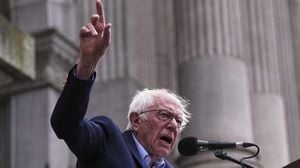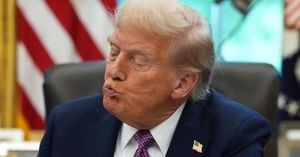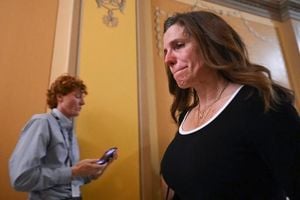America's wealth distribution has come under renewed scrutiny as recent figures reveal the combined net worth of the nation’s twelve richest individuals has reached a staggering $2 trillion. This amount, somewhat astonishingly, puts them just shy of the wealth held by the bottom half of the entire U.S. population, whose total wealth stands at approximately $3.8 trillion according to data provided by the Federal Reserve Bank of St. Louis. This stark inequality has sparked conversations around economic policies and the widening wealth gap.
The list of the twelve wealthiest individuals includes prominent figures like Elon Musk, the CEO of Tesla and SpaceX; Jeff Bezos, the Amazon founder; Mark Zuckerberg, the innovator behind Facebook; and Bill Gates of Microsoft fame. Their wealth, which collectively equals almost $2 trillion, starkly contrasts with the fraction of wealth held by the lower echelons of society. It raises pertinent questions about the dynamics of income and wealth segmentation across different layers of the populace.
According to Krishna Dasaratha, Assistant Professor at Boston University, there are prevailing fears about the incoming administration's policies potentially worsening this economic divide. Dasaratha remarked, "The incoming administration campaigned on or is considering several policies likely to exacerbate wealth inequality, including additional corporate tax cuts and the rollback of antitrust enforcement and worker protections." This observation draws attention to how political decisions intertwine with economic outcomes, signaling possible hardships for the middle and lower classes.
Examining the rise of wealth among the super-rich reveals significant increases over the years. Jensen Huang, co-founder and CEO of Nvidia, is one such example of this trend. His fortune surged from $4.7 billion just three years ago to $122.4 billion today. This explosive growth, attributed primarily to Nvidia's dominance and investment within the artificial intelligence sector, places Huang as the ninth richest American. Interestingly, rumors suggest Huang could have been the world's first trillionaire if he had expanded his ownership of Nvidia—from the current 3.5 percent stake to 40 percent.
Elon Musk's financial ascent has similarly been extraordinary, with his net worth experiencing over 1,256 percent growth over the past four years, positioning him as the wealthiest individual in the U.S. Musk's fortune has been largely driven by his stakes—12 percent of Tesla and 42 percent of SpaceX, which is currently valued at about $210 billion. Despite massive purchase endeavors such as acquiring Twitter, Musk's fortune took hit since the platform is reportedly worth 70 percent less than its purchase price, showcasing the volatility of social media investments.
This wealth concentration amid economic struggles faced by everyday Americans prompts serious discussions about social inequities. Richard Reich, former Secretary of Labor during the Clinton administration, voiced acute concerns on social media, stating, "Wealth inequality is eating this country alive." This sentiment underlines the urgency of the current economic discourse, as many hope the focus on wealth concentration can prompt action toward more equitable solutions.
Recent analysis has painted an alarming picture of wealth distribution, demonstrating the top ten percent of families hold as much as 74 percent of the country’s total wealth, leaving the bottom half with only approximately 2 percent. This gap continues to grow, highlighting the systemic issues underlying economic inequality in America.
California, known for housing many billionaires, finds its median household income surprisingly ranked fifth among states—far from being the wealthiest, showcasing contradictions within the wealth distribution narrative. Such dissonance prompts questions about the sustainability of the capitalist framework as wealth inflates over time, creating divides rather than bridging gaps.
Interestingly enough, as these billionaires command unprecedented economic power, their lifestyles and choices starkly diverge from average American experiences. With increasing frequencies, discussions arise about living wages, affordable healthcare, and access to quality education, raising concerns about the systemic issues fueling inequality.
So, as America grapples with questions about wealth concentration and its ramifications, will the political apparatus effect significant change, or will these disparities continue to grow? The arrival of policymakers willing to confront and tackle these pivotal topics could significantly influence the future economic fabric of the nation. The answers may well define the social and economic environment for generations to come, as America stands at a crossroads—a decision point for equity versus continued disparity.



